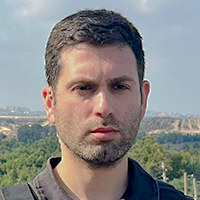Getting your Trinity Audio player ready...
After more than two years in office and in the shadow of the October 7 attack, Lt. Gen. Herzi Halevi officially stepped down Wednesday as Israel Defense Forces chief of staff. His successor, Lt. Gen. Eyal Zamir, was formally appointed by Prime Minister Benjamin Netanyahu and Defense Minister Israel Katz, becoming the IDF’s 24th chief of staff.
Zamir takes command at a critical moment, with ongoing negotiations for a hostage deal that could collapse and reignite fighting in Gaza at any time.
Due to the war, the usual transition ceremonies were scaled down, with attendees in IDF fatigues rather than dress uniforms. After receiving his new rank, Zamir visited the Western Wall and met with President Isaac Herzog before heading to the national memorial hall to lay a wreath in honor of fallen soldiers.
Netanyahu and Katz selected Zamir for the post last month, with his appointment swiftly approved by the advisory committee and the government.
Netanyahu opened the ceremony by reaffirming Israel’s strategic objectives. "Our enemies showed on October 7 that they are capable of striking us in a brutal massacre, the most painful day for our people since the Holocaust," he said. "But today, unlike in the past, we are rooted in our land, and we have IDF chiefs of staff whom the nation looks up to. The people want victory—and they will get victory."
Get the Ynetnews app on your smartphone: Google Play: https://bit.ly/4eJ37pE | Apple App Store: https://bit.ly/3ZL7iNv
Netanyahu also addressed the broader war effort, saying, "We are determined to achieve victory over Iran’s terror, which has made our destruction its mission." Turning to the incoming chief of staff, Lt. Gen. Eyal Zamir, he added, "You act with firm determination, with heart and soul. The experience you have gained has prepared you to command the Southern Command and contribute to building our strength. The time of Zamir has come."
The prime minister also paid tribute to the outgoing chief of staff, Lt. Gen. Herzi Halevi, thanking him for his leadership in the aftermath of the October 7 attack. "Many of the operations you took part in will remain classified for years to come. What has guided you is the desire to protect our country," Netanyahu said. "Thank you for your crucial role after the attack—you mustered the strength to rise from the devastating blow. You went into the field, barely slept."
Following Netanyahu, Katz set a serious tone for Zamir, warning that the challenges ahead allow for no grace period. "You don’t have even one minute of leeway," Katz said. "The security challenges surrounding us leave no room for a hundred-day grace period. In reality, you have no grace period at all. The IDF is in the midst of a military campaign against enemies who have made Israel’s destruction their goal."
Katz also addressed Halevi, acknowledging both the difficulties and achievements of his tenure. "The mission placed on the shoulders of the IDF chief of staff has always been one of the most complex and crucial that the state can entrust to one of its sons," he said. "For the past two years, that mission was yours. You carried it out with great dedication and deep commitment to the country, to the IDF, and to its people. From the failure to defend our people, you rose up, regrouped, and led an army that achieved a series of successes."
Taking the podium, Zamir began his speech with a stark warning: "Hamas has not yet been defeated," he said. "This is a war for survival. We will continue the campaign to bring our hostages home and to achieve decisive victory. The mission before me is clear: to lead the IDF to victory."
Zamir also spoke directly to the families of the hostages, promising to do everything possible to secure their return. "Their faces are before me at every moment. Our moral duty is clear—to bring them all home, by every possible means, and as quickly as possible," he said.
He acknowledged the weight of his new responsibilities. "I am fully aware of the heavy responsibility placed upon me. This is not just another term—this is a historic moment of reckoning," he said. "On the morning of October 7, the IDF failed in its mission. The border was breached, our enemies infiltrated our communities, and they massacred our children, our women, and our brothers."
Addressing the broader Israeli society, Zamir called for a more unified national effort in defense. "The IDF’s strength lies in its unity, its values, its diversity, and in the shared burden of service," he said. "I call on all parts of Israeli society to take part in the sacred duty of defending our homeland. This is a shared responsibility." He also emphasized the need for military expansion, stating, "The defense budget must grow, and the IDF’s force structure must expand rapidly and responsibly."
Zamir concluded his speech by thanking Halevi for his years of service. "Only those who have chosen the demanding path of military service—command and combat leadership—can truly understand the immense responsibility we bear," he said. "On behalf of the IDF, I thank you, the 23rd chief of staff, for your dedicated service and contribution to Israel’s security."
Before leaving office, Halevi issued his own warning about Hamas and Israel’s ongoing military efforts. "Hamas has been dealt a severe blow, but this is not the time to stop. It cannot be allowed to rebuild its strength or regain control," he said. He also emphasized the importance of maintaining pressure on Israel’s other adversaries, saying, "The Iranian axis has been significantly weakened, Hezbollah has suffered severe blows, and we have struck Iran itself. We have created a new security reality in Syria and continue to dismantle terror networks in the West Bank."
In an emotional moment, Halevi turned to Zamir and pledged his continued support. "If you ever need a soldier for a dark night, I am yours—always."
Zamir now faces immediate challenges beyond the war, including appointing a new deputy chief of staff and a commander for the Southern Command, following Maj. Gen. Yaron Finkelman’s departure. He will also oversee ultra-Orthodox enlistment efforts and the military campaign against Hamas, should fighting resume, as well as potential coordination with the U.S. on unprecedented action against Iran.
Zamir, 59, has served in the IDF for 38 years in various combat and leadership roles. He will be the oldest IDF chief of staff to take office, surpassing predecessors like Gadi Eisenkot and Dan Halutz, who completed their terms at 58. He is also the first tank officer to hold the position since Lt. Gen. David “Dado” Elazar in the 1970s, who himself resigned from the position over the failures that led to the 1973 Yom Kippur War.






